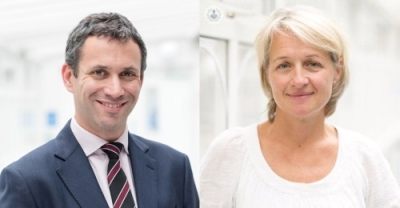
29 May 2024
Researchers at Royal Brompton and Harefield hospitals (RBHH) have become the first in Europe to recruit a patient to a disease-modifying clinical trial for patients with primary ciliary dyskinesia (PCD).
Funded by ReCode Therapeutics, the experimental trial is led by respiratory consultants Professor Michael Loebinger and Professor Claire Hogg, and is taking place at RBHH which is home to the world’s largest cohort of patients with PCD.
Primary Ciliary Dyskinesia (PCD)
PCD is a rare inherited genetic condition which affects the structure and/or function of the cilia - tiny moving structures lining the airways, ears, sinuses and other areas of the body.
The sweeping motion of cilia is important for keeping these areas clean and free from infection and is our primary defence mechanism protecting our lungs. In people with PCD, this sweeping motion does not happen in the normal way, and in some, it does not happen at all.
Currently, there is no cure for PCD and the treatment options available are limited to those which reduce the symptoms due to retained mucous secretions, such as chronic nasal congestion, recurring pneumonia or chest colds.
Patients with PCD have a specific protein missing from their cilia because the genetic material which makes, or encodes for, the protein is missing. This new experimental treatment aims to use specific mRNA therapy to replace this protein within the airway cells and potentially correct the lung disease.
mRNA are specific codes or instructions used to make specific things in the body, such as proteins.
The clinical trial
The experimental treatment, known as RCT1100, is made up of mRNA packaged inside microscopic carrier particles called lipid nanoparticles (LNPs), which allows it to be delivered to the lungs by inhalation.
RCT1100 is put into a nebuliser that enables it to be turned into a mist that can be inhaled by the patients. It is hoped that, by delivering the treatment directly to specific cells in the airways, it may be able to restore function to the cilia which will help people with this form of PCD.
The clinical trial will involve patients with PCD, caused by a specific mutation in the DNAI1 gene, inhaling RCT1100, and the then undergoing a series of tests including an ECG, blood tests and urine tests.
These tests will be used to determine a) how safe and well tolerated the treatment is, b) if parts of RCT1100 are detectable in the blood, and c) how the body’s immune system responds to the treatment.
Professor Loebinger, who is leading on the study, explained the importance of experimental treatments for these groups of patients. He said:
“This trial, the first disease modifying therapeutics study for patients with PCD, is a very exciting first step in the development of new treatments that will target and treat the underlying causes of PCD. If we can demonstrate that RCT1100, when delivered directly to the lungs via nebuliser, leads to recovery of ciliary structure and function within the airways then this will lead the way for clinical trials targeting other PCD genetic mutations.
“The explosion of new disease modifying treatments for patients with cystic fibrosis has shown us how important and impactful the advent of gene based disease modifying therapies has been.”
Professor Hogg is leading on the biomarkers aspect of the trial which will look at the function and structure of the cilia before and after the treatment.
Explaining why our hospitals are best placed for research like this, she said:
“RBHH is ideally suited to deliver on these trials as we have the largest cohort of well phenotyped patients with PCD. The National PCD service in England leads the way globally with the diagnosis of PCD, delivering the most comprehensive approach to assessing the ciliary function and structure of these complex airway structures known as cilia.”
“We are leaders in the field of research and development of novel and advanced diagnostic tests, and the world’s first PCD centre to be developing machine learning tools to improve the analysis of ciliary structure and function. Our computer vision applications will be part of the algorithm for the biomarkers aspect of the study.”
A paediatric arm of the trial is planned.
To find out more about our research, please contact us.
Read more research stories or sign up to the research newsletter.
